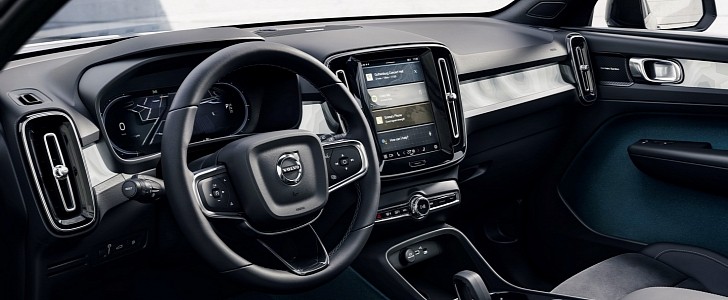All of Volvo’s future electric cars will be 100% leather-free, as the Swedish carmaker takes an ethical stand for animal welfare. By 2025, Volvo wants 25% of the material in new cars to consist of recycled and bio-based content. This goal is also driven by a concern about the negative environmental impacts of cattle farming, including deforestation.
Instead of leather, Volvo will offer its customers high-quality sustainable materials such as Nordico, a new material that consists of textiles made from things such as PET bottles, bio-attributed material from sustainable forests in Sweden and Finland, and corks recycled from the wine industry. You’ll be able to see, feel and touch this material in next-generation Volvo vehicles.
The company will also continue to offer wool blend options from certified suppliers able to source the wool responsibly. This should ensure full traceability and animal welfare in its wool supply chain.
“Being a progressive car maker means we need to address all areas of sustainability, not just CO2 emissions,” said Stuart Templar, director of global sustainability at Volvo Cars. “Responsible sourcing is an important part of that work, including respect for animal welfare. Going leather-free inside our pure electric cars is a good next step towards addressing this issue.”
Another goal for the Swedish brand includes using fewer residual products from livestock production – commonly used within or in the production of plastics, rubber, lubricants and adhesives. This is yet another important step, because simply going leather-free doesn’t mean that the interior of the vehicle is suddenly “vegan”.
“This is a journey worth taking. Having a truly progressive and sustainable mindset means we need to ask ourselves difficult questions and actively try to find answers,” added Templar.
Now, if you’re thinking why would Volvo only do this for its future electric models and not internal-combustion ones as well, it’s because there won’t really be any new ICE-powered Volvo models in the future, with all of them set to be phased out by 2030.
The company will also continue to offer wool blend options from certified suppliers able to source the wool responsibly. This should ensure full traceability and animal welfare in its wool supply chain.
“Being a progressive car maker means we need to address all areas of sustainability, not just CO2 emissions,” said Stuart Templar, director of global sustainability at Volvo Cars. “Responsible sourcing is an important part of that work, including respect for animal welfare. Going leather-free inside our pure electric cars is a good next step towards addressing this issue.”
Another goal for the Swedish brand includes using fewer residual products from livestock production – commonly used within or in the production of plastics, rubber, lubricants and adhesives. This is yet another important step, because simply going leather-free doesn’t mean that the interior of the vehicle is suddenly “vegan”.
“This is a journey worth taking. Having a truly progressive and sustainable mindset means we need to ask ourselves difficult questions and actively try to find answers,” added Templar.
Now, if you’re thinking why would Volvo only do this for its future electric models and not internal-combustion ones as well, it’s because there won’t really be any new ICE-powered Volvo models in the future, with all of them set to be phased out by 2030.







